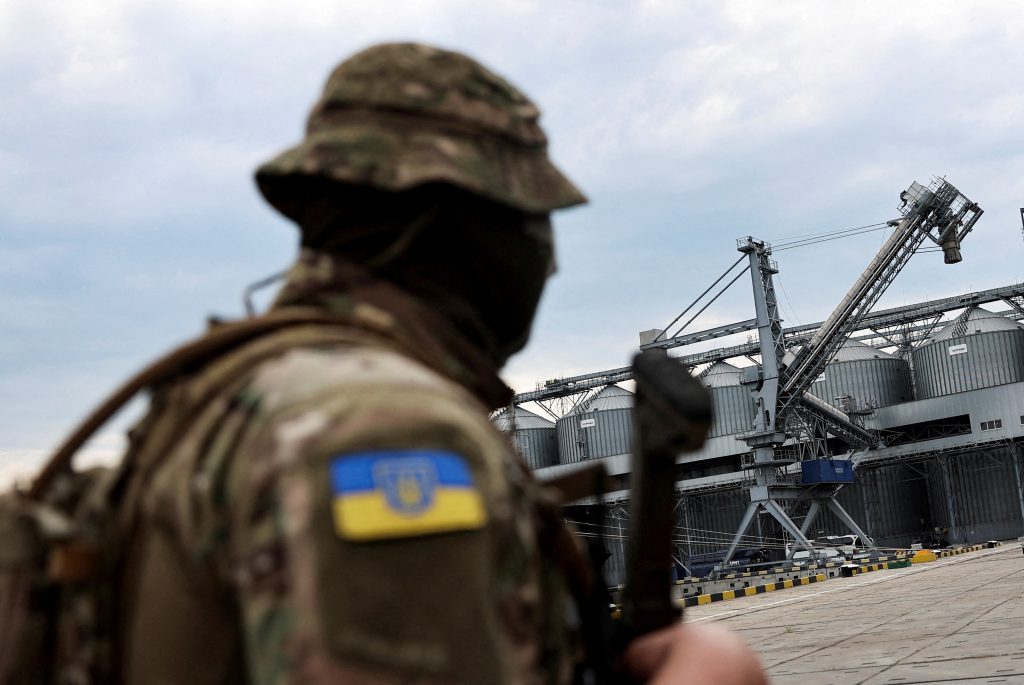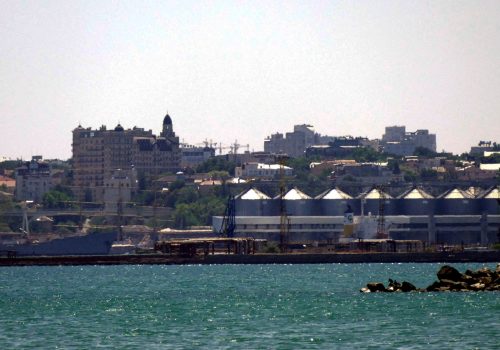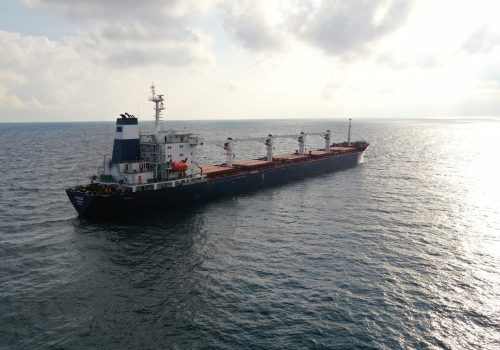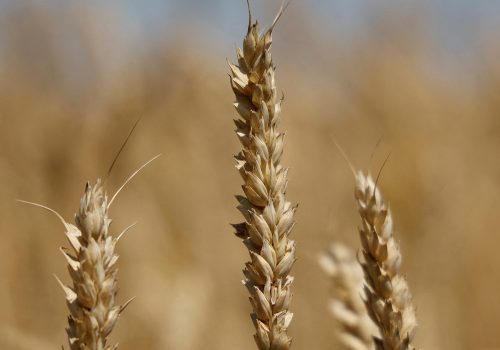The ships are still sailing, but for how long? On October 29, Russia withdrew from the United Nations (UN)-brokered deal allowing safe passage for ships carrying grain and fertilizer from Ukraine’s Black Sea ports that Russia had blocked off since the start of the war. While Russia has not reimposed the blockade, Moscow could at any point choke off one of the world’s biggest wheat exporters. The UN is working to revive the agreement, but Ukraine, Turkey, and the UN are planning to pause shipments on Tuesday. As the Atlantic Council prepares to host the Global Food Security Forum on the sidelines of the Group of Twenty (G20) summit in Bali, Indonesia, we turned to our experts on global food security and the war in Ukraine to explain why the deal is in peril and forecast what’s coming next.
What are the stakes for global food security of keeping these shipments flowing? What happens if they are choked off again?
Russia’s suspension of an always-tenuous grain-exporting agreement is only the latest in a series of developments over the course of the last year that underscore the need for world leaders to place food security at the very top of the global diplomatic agenda—starting with the G20.
A year ago, before the war in Ukraine began, I wrote of the “chronic vulnerability, especially for the world’s poor, regarding the most fundamental of all goods: food.” My goal then was to warn of long-term dangers, chiefly from a changing climate, to the global food supply and, consequentially, to global hunger, famine, and violent conflict. In 2022, both the war in Ukraine and worldwide climate disruption—particularly in the northern hemisphere, as several breadbaskets there saw catastrophic drought this summer—show how fragile the global food supply is at the moment. Any further disruptions will only fuel more hunger and raise the risk of increased conflict and political upheaval, particularly in the Global South. Given current events, drawing attention to this problem now should be straightforward enough. The harder part will be keeping it there over the long run.
—Peter Engelke is deputy director and a senior fellow at the Scowcroft Center for Strategy and Security, and a nonresident senior fellow with the Global Energy Center.
How does this news fit in the wider context of Russia’s war in Ukraine?
Following the successful Ukrainian strike on Russia’s Black Sea fleet, Moscow announced that it was ending its participation in the grain deal brokered in July by the UN and Turkey, after Moscow had blocked grain shipments from Ukraine since it launched its conventional invasion of the country last February. The grain deal was to be renewed in November, but many analysts had anticipated that Moscow would not agree its extension. When the deal was reached in early summer, the Russian military seemed to have recovered from its early spring defeats near Kyiv, Chernihiv, and Kharkiv, and was making slow advances toward its then newly stated goal of seizing the entire Donbas from Ukraine. Since then, Moscow’s military fortunes have plummeted. With HIMARs and other long-range artillery provided by the United States and its NATO allies, Ukraine stopped the Kremlin offensive in July and launched a successful counter-offensive first in the northeast near Kharkiv and now in the south near Kherson. To make matters worse for the Kremlin, Ukraine then rendered the Kerch Strait Bridge inoperable for supply purposes. This was a great embarrassment for Russian President Vladimir Putin and made it much harder to supply Russian forces in southern Ukraine.
Given his military’s inability to stem Ukraine’s advances on the battlefield, Putin has resorted to other measures to inflict punishment, focusing in on the country’s civilian population. Following the strike on the Kerch Strait Bridge, he initiated a major bombing campaign on Ukrainian infrastructure and, particularly, its electricity grid. Observers deemed it unlikely that Putin, under pressure at home for Russia’s lackluster performance in the war, would renew the grain deal, which provides substantial revenues to Ukraine.
Trying once again to turn lemons into lemonade, Putin tied his cancellation of the grain deal to Ukraine’s latest attack on the Black Sea Fleet, saying that a ship involved in Russia’s enforcement of the deal was hit. Moscow is claiming that only one warship was hit and that it was able to neutralize the unmanned air and surface drones used in the attack, but other reports suggest that the current Black Sea flagship, the Admiral Makarov, was hit along with the minesweeper Igor Golubets.
Moscow’s announcement has UN Secretary General António Guterres scrambling to restore the deal; but the Kremlin has for the moment not decided to reimpose the blockade that cut off Ukrainian grain exports last spring and prompted the need for the original grain deal. It may well be that Moscow now fears blowback if it reimposes the blockade. The United States and European Union should step up their efforts to encourage Turkey and major Ukrainian food importers in the Global South to urge Moscow to keep its hands off Ukrainian grain shipments.
—John Herbst is the senior director of the Eurasia Center and a former US ambassador to Ukraine and Uzbekistan.
What can Turkey and the West do right now to prevent this from spiraling out of control?
The grain corridor can work successfully in a trilateral format; Ukraine needs military escorts, not new deals with Russia.
Though Russia officially suspended its participation in the grain deal—connecting this decision to the “massive” attacks on its Black Sea Fleet 220 kilometers away from the grain corridor—Moscow had made it clear that it had no intention to keep the initiative alive long before that. Since mid-September, Russian representatives had insisted on conducting full-blown inspections of ships, hindering the normal maritime traffic flow and daily operations of the Joint Coordination Center (JCC) established as part of the grain deal: The average duration of the full inspection procedure in the Marmara Sea has increased by five times, reaching in some cases more than twenty days. This has happened in parallel with Russian leadership’s demands to review the terms of the deal to facilitate exports of Russian wheat as well as supplies of fertilizers such as ammonia to the world markets.
Russia’s decision to undermine the work of the grain corridor is, therefore, nothing other than blackmail and must be treated as such.
Ukraine has accused the Kremlin of using a “false pretext” to legitimize its attacks on global food security and critical energy infrastructure in Ukraine. But that’s not all that Russia’s recent moves will do: They’ll halt the deal, which helped successfully export more than nine million tons of Ukrainian grain while offering to replace it with Russian cereals (often looted from the occupied territories of Ukraine). The moves will also increase pressure on the global markets, thus causing a price spike and triggering food inflation; further increase pressure on Western policymakers, raising the cost of their support to Ukraine; and try to stop Ukrainian counter-offensives in the south, as the Kremlin links the success of the grain deal to a ceasefire in the occupied territories of Kherson and Crimea.
Here’s what Turkey and the West should do:
- Secure the grain corridors and continue to implement the deal in a trilateral format, in close coordination among the UN, Turkey, and Ukraine. After vessels resumed moving on October 31, following a joint decision of the UN Secretariat and the Turkish delegation at the JCC, forty-six inspections were carried out on Monday and thirty-six on Tuesday. That number helps prove not only the viability of JCC mechanisms, but also their increased efficiency when not blocked by the Russian delegation.
- Debunk Russian myths that other parties violated the deal by excluding Russia. It was Russia’s unilateral decision to pull out of the deal, and its participation can be easily resumed by the decision to come back. Secondly, the grain deal was launched back in July as two parallel deals: one among the UN, Turkey, and Ukraine; and another among the UN, Turkey, and Russia. The mechanisms envisioned by the deal are still in place, including the JCC and the UN-Turkey inspection teams; the only violation of the deal would be the Russian decision to attack the convoys.
- Be ready for Russian provocations and provide navy escorts. Moving along already loaded vessels waiting for inspection has been successful so far. The situation may, however, play out differently for the new ships yet to be loaded in the Ukrainian ports. While direct Russian attacks on the bulwarks are unlikely, the probability of Russian provocations, incidents on sea, and mining of the waterways remain high. Military escorts for the humanitarian convoys provided by Turkey or other NATO allies would both secure uninterrupted supplies of grain to the countries in need and send a clear message to Russia that its blackmail will no longer be tolerated by the West. Continuing supplies of air-defense systems to Ukraine remains critical for the protection of its port infrastructure and grain storage facilities as the likelihood of Russian attacks increases.
—Yevgeniya Gaber is a nonresident senior fellow at the Atlantic Council IN TURKEY and was previously a foreign-policy advisor to the prime minister of Ukraine.
Further reading
Mon, Jul 25, 2022
Grain drain: Why Turkey can’t afford to ignore Russian grain smuggling from Ukraine
TURKEYSource By Yevgeniya Gaber
The diplomatic goodwill Turkey won in its key role in the deal to unlock Ukrainian grain export is at risk as Russia may prove a spoiler.
Thu, Aug 4, 2022
Ukraine grain deal: World must still confront Putin’s Black Sea blackmail
UkraineAlert By
The recent UN-brokered agreement to end Russia's Black Sea blockade and renew Ukrainian grain shipments is a step in the right direction but the only way to truly safeguard global food security is via military measures.
Fri, Jul 22, 2022
Ukraine can feed the world again. But at what cost?
Fast Thinking By
What did Ukraine really gain? Our experts shipped off their takes.
Image: A Ukrainian serviceman stands in front of silos of grain from Odesa Black Sea port, before the shipment of grain as the government of Ukraine awaits signal from UN and Turkey to start grain shipments, amid Russia's invasion of Ukraine, in Odesa, Ukraine July 29, 2022. Photo by Nacho Doce/Reuters



